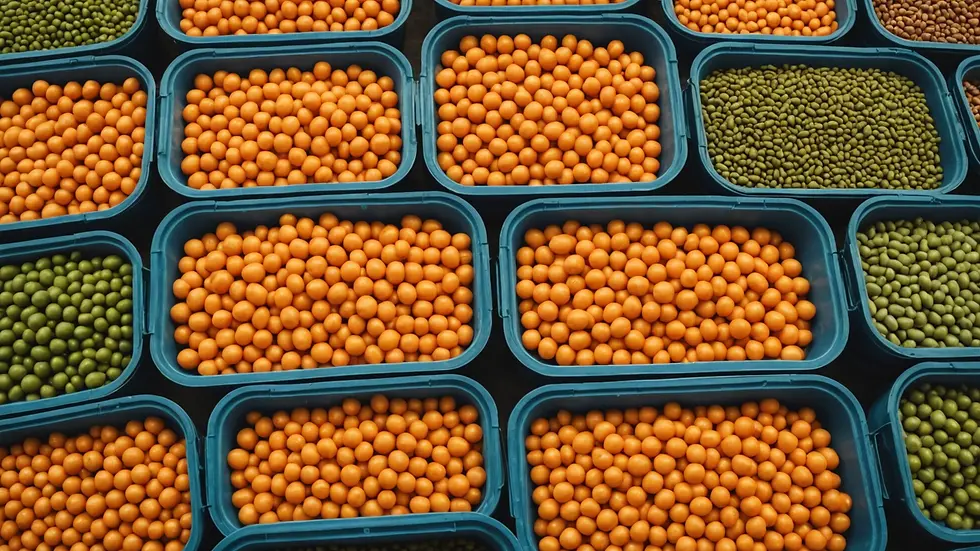What Should You Consider When Choosing the Right Fish Food for Your Aquarium?
- Jyotiraj Borah
- Feb 6
- 5 min read
Choosing the right fish food for your aquarium is vital for your fish's health and happiness. A well-balanced diet promotes vibrant colors and longer lifespans. With countless options available, selecting a suitable food can feel daunting. This guide breaks down essential factors that will help you choose the best food for your aquatic friends, ensuring they thrive in your home.
Understanding Fish Dietary Needs
Fish have specific dietary requirements based on their species, age, and size. Some fish are herbivores, while others are carnivores or omnivores. Understanding these needs is essential to providing a balanced diet.
For example, herbivorous fish like Angelfish thrive on plant-based foods. Algae flakes or spirulina pellets are excellent options for them. Conversely, carnivorous fish like Clownfish benefit from diets high in protein, preferring pellets made from shrimp or fish meal. Omnivorous species, like Betta fish, can enjoy both plant and meat-based foods, allowing for varied and balanced meals.
In addition to species-specific requirements, the age of your fish plays a crucial role in their dietary needs. Young fish, or fry, require fine particles or powdered foods for growth. Adult fish can manage larger pellets or flakes, which typically have higher densities of nutrients.
The Different Types of Fish Food
The variety of fish food can be overwhelming, but they typically fall into four main categories:
Flakes: A staple for many aquarium fish, these float on the surface and provide nutrition for both herbivorous and carnivorous species.
Pellets: Available in various sizes, pellets are ideal for different species. Larger pellets are suited for surface feeders, while smaller sinking pellets cater to bottom dwellers.
Granules: These are smaller than pellets and often dissolve slowly in the water. This type is perfect for smaller species, like Tetras, and comes in both herbivore and carnivore formulas.
Frozen and Freeze-Dried Foods: Options such as bloodworms and brine shrimp are nutrient-dense treats that can supplement your fish’s primary diet.
To foster a balanced diet that mimics their natural eating habits, consider mixing and matching these types of food.
Nutritional Content and Ingredients
Always check the nutritional content and ingredients in fish food before making a purchase. High-quality food ensures your fish receive the essentials they need to thrive.
Protein Content: For carnivorous fish, a high protein content is crucial. Look for products that list fish meal or another quality protein as the first ingredient. For instance, a good betta pellet might contain around 40% protein.
Fats and Oils: Healthy fats contribute to energy and assist in maintaining bright colors. Omega-3 and Omega-6 fatty acids are vital for overall health, with varying recommendations suggesting they should comprise about 5-10% of your fish’s diet.
Fiber: Herbivorous fish need fiber for digestion. Foods that include plant ingredients, such as spirulina or green peas, will aid their digestive processes.
Vitamins and Minerals: A premium fish food should list essential vitamins, like A, C, D, and E, along with trace elements such as calcium and iron, which support overall health.
Importance of Quality over Price
It’s tempting to choose cheaper options, but quality matters significantly in fish diets. Low-cost fish food often contains fillers and inferior ingredients that do not provide adequate nutrition.
Investing in high-quality fish food can lead to healthier fish with vibrant colors and potentially longer lifespans. Top brands frequently invest in scientific research, resulting in formulas optimized for healthier growth. Studies have shown that fish fed quality diets can grow up to 30% faster than those on inferior foods.
A Closer Look at Special Diets
Some fish species have unique dietary requirements. For instance, larger freshwater fish like Oscars may need special high-protein diets, while marine fish require food tailored to their specific salinity levels.
Cichlid-Specific Foods: Cichlids, known for their aggressive feeding habits, need higher protein diets. Specialized cichlid pellets cater to their digestive systems and provide essential nutrients.
Betta Fish Diets: Bettas are carnivorous and need protein-rich diets. High-quality betta pellets or frozen foods like bloodworms can ensure they thrive.
Goldfish Nutritional Needs: Goldfish should not have high-protein diets. Instead, they flourish on foods rich in vegetable matter and fiber, such as pellets designed specifically for them, which can also help prevent bloating.
Storage and Freshness of Fish Food
Proper storage is crucial to maintain the freshness of fish food and prevent spoilage.
Keep fish food in a cool, dry place, protected from direct sunlight. Vacuum-sealed packages help preserve freshness, but once opened, transfer the food to airtight containers. This method can prolong the food's quality, which is especially critical since spoiled food can harm your fish’s health.
Always verify expiration dates and discard any food that shows signs of spoilage, such as unusual smells or discoloration.
Feeding Habits and Portion Control
Feeding your fish the right amounts is as important as the quality of the food.
Frequency: Adult fish generally require feeding once daily, while younger fish may need two to three meals daily.
Portion Control: As a rule of thumb, serve only as much food as your fish can consume in two to three minutes. If you notice uneaten food collecting at the bottom, you may be overfeeding.
To ensure your fish receive balanced nutrition, consider rotating different types of food throughout the week, offering variety and ensuring comprehensive nutrient intake.
Behavioral Aspects of Fish Feeding
Paying attention to your fish’s behavior during feeding can reveal much about their health and preferences.
Healthy fish are typically active and eager to feed. If they appear disinterested or reluctant to eat, this could signal the need for a diet change or adjustment in their feeding routine.
Certain fish may exhibit aggressive feeding behaviors during breeding well-being; keep an eye on your fish’s reactions to better assess their appetite and overall health.
Common Misconceptions About Fish Food
Misunderstandings about fish diets can lead to poor feeding choices. Here are a few common myths:
"Fish Only Eat What is Best for Them": While fish have natural instincts, they tend to prefer familiar foods, making gradual introductions essential.
"All Fish Can Eat the Same Food": This is false because different species have uniquely varying dietary needs and feeding habits.
"Feeding Fish Often Will Make Them Grow Faster": Overfeeding can cause health issues rather than accelerate growth.
Final Thoughts on Fish Feeding
Selecting the right fish food for your aquarium requires careful consideration. Understanding your fish's dietary needs, recognizing the various food types available, and evaluating nutritional content are essential steps.
By making informed decisions, you're not only contributing to your fish's health but also enhancing your overall aquarium experience. With the right knowledge and commitment to your fish’s needs, you'll create a vibrant and flourishing aquatic habitat.

Ensuring a happy and healthy aquarium is possible with the right approach. Always prioritize quality, observe your fish's actions and adjust their diet as they grow. Happy fish-keeping!





Comentários